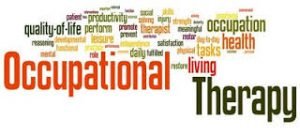 Have you ever imagined what it would be like to wake up one day and find yourself not being able to participate in activities you enjoy either due to a disability you may have developed, due to an injury, due to low motivation or even developmental difficulties that are beyond your control? People with disabilities find it difficult to participate in activities of daily living skills which include self care tasks, productivity tasks and pursing leisure activities due to matters beyond their control and Occupational Therapists can help.
Have you ever imagined what it would be like to wake up one day and find yourself not being able to participate in activities you enjoy either due to a disability you may have developed, due to an injury, due to low motivation or even developmental difficulties that are beyond your control? People with disabilities find it difficult to participate in activities of daily living skills which include self care tasks, productivity tasks and pursing leisure activities due to matters beyond their control and Occupational Therapists can help.
Occupational Therapists (OT) can work across many services including:
- Hospitals
- Schools
- Disabled Children
- Reablement services
- Dementia Care
- Learning Disabilities
- Mental Health
- Secure Mental Health Services
- Residential homes for the elderly
Occupational Therapists are a group of individuals who provide support to people in health care settings who have difficulties participating in every day activities. Through assessment and data gathering, Occupational therapists find out what people find most difficult and then put in place activities which are purposeful and meaningful to the individuals so they can remain independent in every day tasks.
Example: Brushing your hair requires many tasks, many motor skills, perceptual and cognitive skills. For people with any physical dysfunction, they might find this a challenge, therefore activities will be adapted through assessment to make life easier for the individuals so they continue brushing their hair as independently as possible.The over all aim is independence and minimising risk. They can advise on how people can adapt their lifestyle in order to increase their independence.
So is occupation a means to an end?
 OT’s primarily assesses individuals ability to participate in activities independently, through treatment planning and setting goals. Therefore, activities can provide an end result to meeting the overall goals.
OT’s primarily assesses individuals ability to participate in activities independently, through treatment planning and setting goals. Therefore, activities can provide an end result to meeting the overall goals.
Example:An elderly lady in her 70’s has Arthritis in her right hand and through assessment struggles to make a cup of tea safely in the kitchen. Observations showed that she struggles to hold her cup, and pour water from the kettle safely.
Treatment Goal: “In 4 weeks, I would like to make a cup of tea safely and independently in my kitchen.”
Tasks to meet goal:
- For OT’s to provide equipment e.g. kettle tipper
- A non slip mat for her kettle and cup to rest on
- Adaptive cups/cutlery (either light weight or heavy weight) depending on degree of difficulty.
The therapeutic relationship has to always be maintained from the moment the OT meets with them to completing their goals as it will enable to the individual to work with the therapist more effectively.
The end goal for the elderly lady was to make a cup of tea safely in her kitchen as she considered this an important occupation. She had a good relationship with her therapist, knew the expectations, was involved in the whole process and as a result of this, her goals were met.
It goes without saying, that making a cup of tea may come across as a simple task for those who are able to do so. However, we fail to realise the impact of how someone with a physical disability might actually struggle to do this task and the impact this has.
OT is clearly very important in healthcare.
Downvoting a post can decrease pending rewards and make it less visible. Common reasons:
Submit
We offer services in Occupational Therapy, Speech Pathology, Physiotherapy, Exercise Physiology & Positive Behaviour Support.
https://steemit.com/health/@sohagmia/does-my-child-need-occupational-therapy
Downvoting a post can decrease pending rewards and make it less visible. Common reasons:
Submit